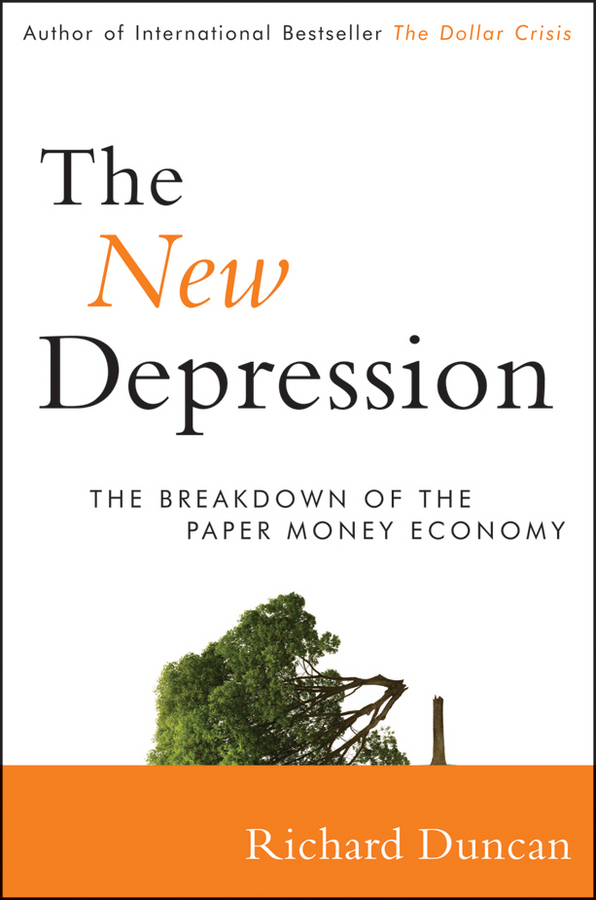Электронная книга: Richard Duncan «The New Depression. The Breakdown of the Paper Money Economy»

|
Why the global recession is in danger of becoming another Great Depression, and how we can stop it When the United States stopped backing dollars with gold in 1968, the nature of money changed. All previous constraints on money and credit creation were removed and a new economic paradigm took shape. Economic growth ceased to be driven by capital accumulation and investment as it had been since before the Industrial Revolution. Instead, credit creation and consumption began to drive the economic dynamic. In The New Depression: The Breakdown of the Paper Money Economy, Richard Duncan introduces an analytical framework, The Quantity Theory of Credit, that explains all aspects of the calamity now unfolding: its causes, the rationale for the government's policy response to the crisis, what is likely to happen next, and how those developments will affect asset prices and investment portfolios. In his previous book, The Dollar Crisis (2003), Duncan explained why a severe global economic crisis was inevitable given the flaws in the post-Bretton Woods international monetary system, and now he's back to explain what's next. The economic system that emerged following the abandonment of sound money requires credit growth to survive. Yet the private sector can bear no additional debt and the government's creditworthiness is deteriorating rapidly. Should total credit begin to contract significantly, this New Depression will become a New Great Depression, with disastrous economic and geopolitical consequences. That outcome is not inevitable, and this book describes what must be done to prevent it. Presents a fascinating look inside the financial crisis and how the New Depression is poised to become a New Great Depression Introduces a new theoretical construct, The Quantity Theory of Credit, that is the key to understanding not only the developments that led to the crisis, but also to understanding how events will play out in the years ahead Offers unique insights from the man who predicted the global economic breakdown Alarming but essential reading, The New Depression explains why the global economy is teetering on the brink of falling into a deep and protracted depression, and how we can restore stability. Издательство: "John Wiley&Sons Limited (USD)"
ISBN: 9781118157800 электронная книга Купить за 2471.5 руб и скачать на Litres |
Другие книги автора:
| Книга | Описание | Год | Цена | Тип книги |
|---|---|---|---|---|
| The Dollar Crisis. Causes, Consequences, Cures | In this updated, second edition of the highly acclaimed international best seller, The Dollar Crisis: Causes, Consequences, Cures, Richard Duncan describes the flaws in the international monetary… — John Wiley&Sons Limited (USD), электронная книга Подробнее... | электронная книга |
Richard Duncan
Richard Duncan (??-February 1819) was a soldier, judge and political figure in
He was born in
In 1788, he became a judge and a member of the land board in the Lunenburg District. In 1792, he became lieutenant for the county of Dundas and a member of the
He died near
External links
* [http://www.biographi.ca/009004-119.01-e.php?&id_nbr=2383 Biography at the "Dictionary of Canadian Biography Online"]
Источник: Richard Duncan
См. также в других словарях:
money — moneyless, adj. /mun ee/, n., pl. moneys, monies, adj. n. 1. any circulating medium of exchange, including coins, paper money, and demand deposits. 2. See paper money. 3. gold, silver, or other metal in pieces of convenient form stamped by public … Universalium
New England — This article is about the region of the United States. For other uses, see New England (disambiguation). New England … Wikipedia
Great Depression — This article is about the severe worldwide economic downturn in the 1930s. For other uses, see The Great Depression (disambiguation) … Wikipedia
motion picture, history of the — Introduction history of the medium from the 19th century to the present. Early years, 1830–1910 Origins The illusion of motion pictures is based on the optical phenomena known as persistence of vision and the phi phenomenon. The first … Universalium
Long Depression — Not to be confused with long term depression. The Long Depression was a worldwide economic crisis, felt most heavily in Europe and the United States, which had been experiencing strong economic growth fueled by the Second Industrial Revolution… … Wikipedia
Elections in the United States — For the most recent elections, see United States elections, 2010. For a complete list of elections, see List of elections in the United States. An 1846 painting showing a polling judge administering an oath to a voter The United States has a… … Wikipedia
